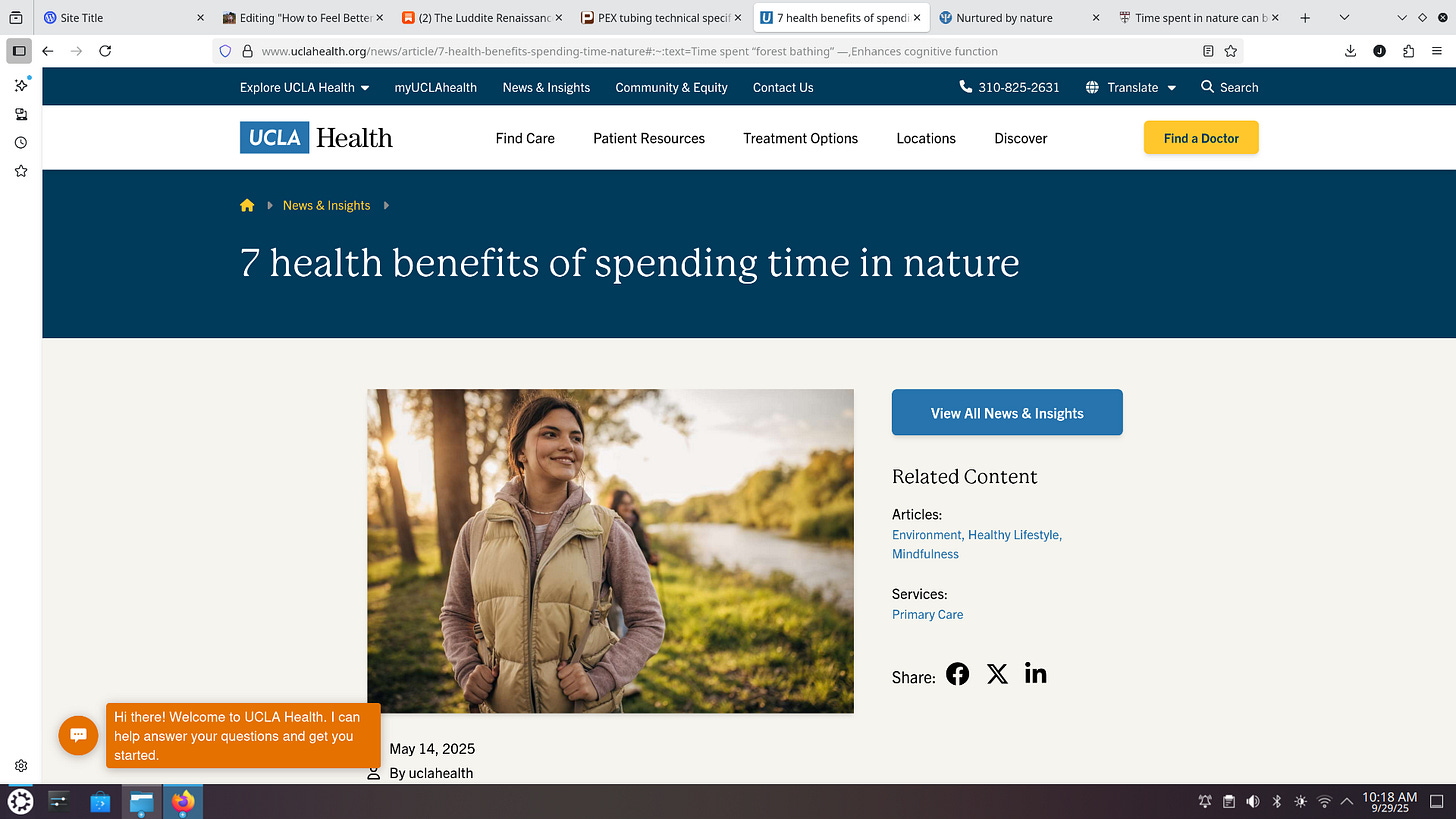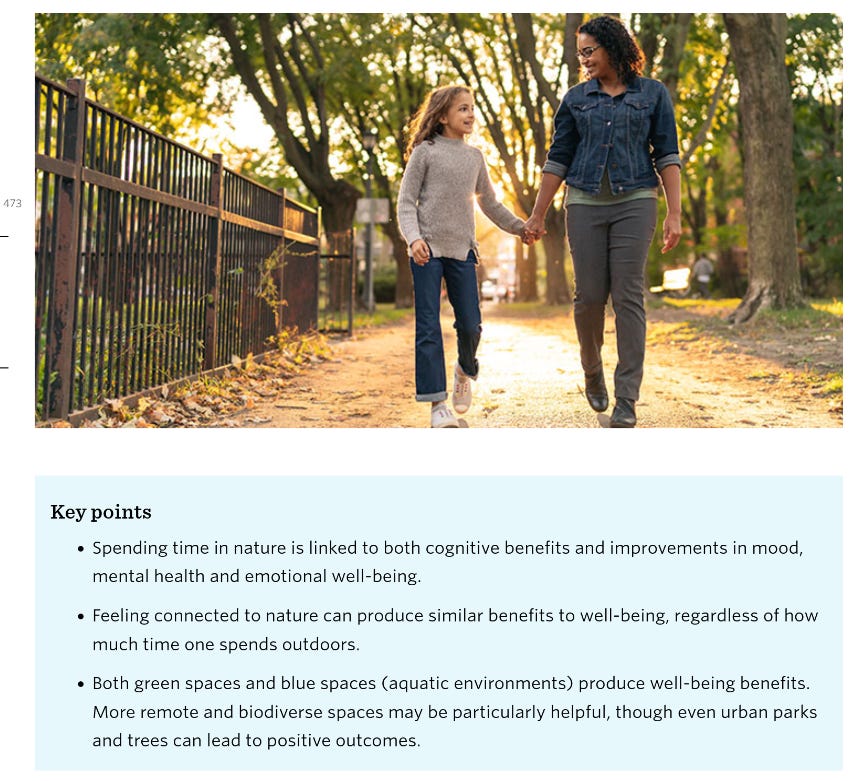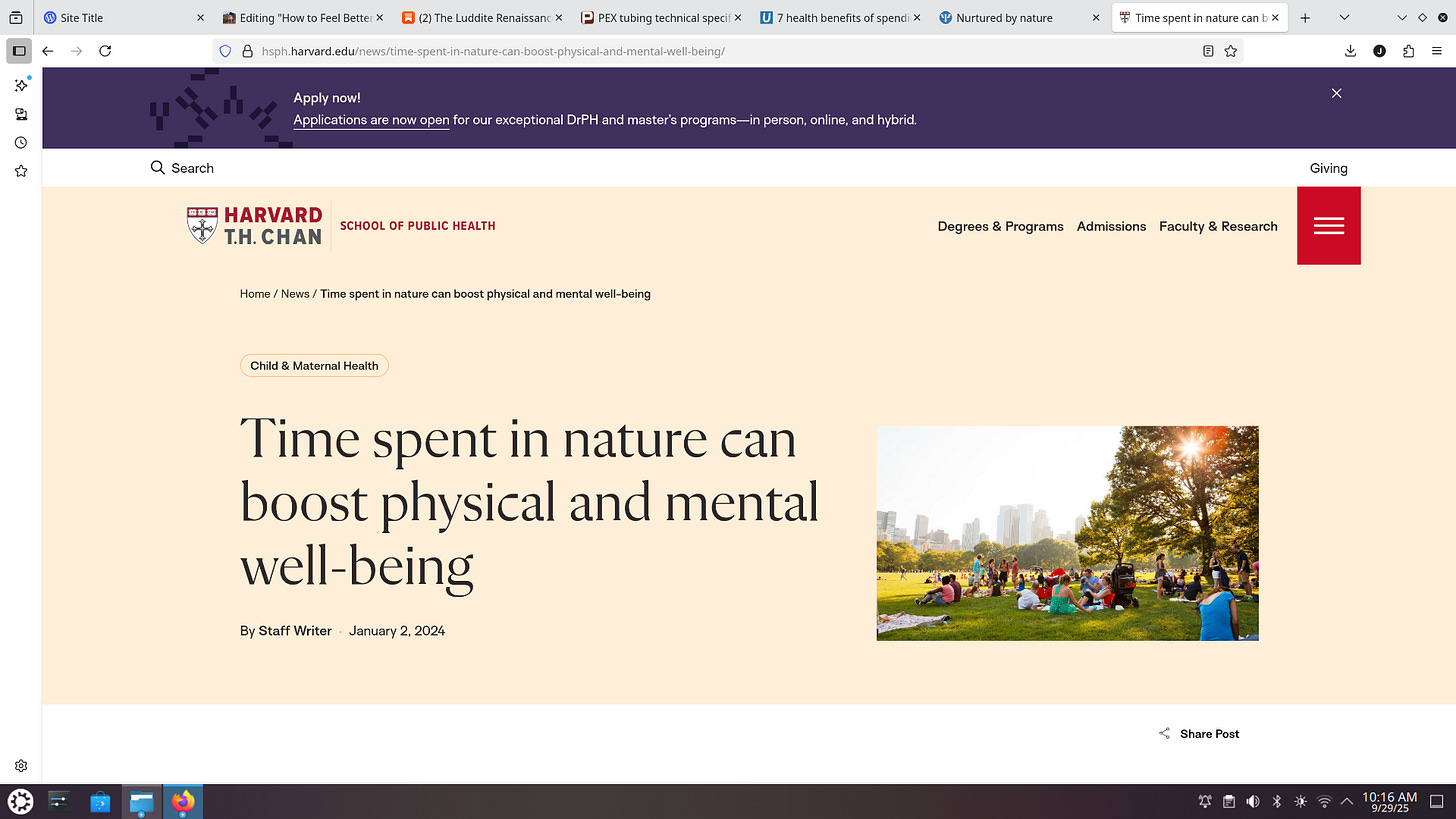How to Feel Better
and think better
If you want to feel better and think better, spend more time in nature.
There is no dispute that this works. Here’s an article from UCLA:
The UCLA one lists 7 specifics benefits, physical and mental
Boosts immune system
Being in nature can support immune health in a couple of ways. Any time you are outside — rain or shine — you expose yourself to vitamin D, which is good for your immune system and your bones. Lower vitamin D levels are linked to a higher risk of viral infection
.
Time spent “forest bathing” — immersed in the forest atmosphere — is especially good for your immune system. The forest air you breathe in is full of phytoncides, chemicals shed by forest plants. Phytoncides’ antifungal and antibacterial qualities stimulate your body to increase the white blood cells responsible for fighting tumor- and virus-infected cells.
Enhances cognitive function
Exposing yourself to green space can benefit your cognitive abilities in the short- and long-term. But just being outside isn’t enough — you need to be in a natural and peaceful environment. Urban settings require you to use your attention to overcome the stimulation of the environment, and your cognitive abilities can suffer.
Spending time in nature can also spark creativity. Research
suggests that nature stimulates curiosity and helps recharge your focus and attention, which is critical when developing new ideas.
Improves heart health
Spending time in nature can help your heart be healthier by increasing your movement and reducing stress. Time in a natural environment also seems to have a direct effect on your heart’s function, specifically your heart rate and blood pressure. Many studies
report overwhelming evidence that time in nature decreases blood pressure levels regardless of whether you typically have hypertension (high blood pressure).
Promotes better sleep quality
Exposure to natural light every day — especially first thing in the morning — can help regulate your circadian rhythm, which is your body’s natural 24-hour cycle. When your internal clock is naturally aligned with the day and night cycle, it can improve the quality of your sleep and how alert you are during the day.
Reduces stress
show that spending time in a green space or natural environment can help reduce psychological stress. Just 20 minutes spent in any space that evokes nature can significantly reduce cortisol (stress hormone) levels. But fully immerse yourself in a natural environment for 20 to 30 minutes for the greatest drop in cortisol. After that, cortisol tends to level out.
Stimulates physical activity
Exercising in nature offers a different experience than working out indoors. A better experience can potentially lead to increased motivation to stick with an exercise routine. As a bonus, people tend to work out for a longer period and at a higher intensity
when they exercise in nature.
Supports mental health
Surrounding yourself with nature can improve your mood and reduce the symptoms of anxiety and depression. It can alter the brain activity in your prefrontal cortex — the part regulating emotions.
Green space can also have a protective effect on depression risk. Researchers
say that people who spend five or more hours outside on weekends tend to have a lower risk of mild depression than people who spend less than 30 minutes outdoors.
Here’s a quote from the American Psychological Association:
Cognitive Benefits
Spending time in nature can act as a balm for our busy brains. Both correlational and experimental research have shown that interacting with nature has cognitive benefits—a topic University of Chicago psychologist Marc Berman, PhD, and his student Kathryn Schertz explored in a 2019 review. They reported, for instance, that green spaces near schools promote cognitive development in children and green views near children’s homes promote self-control behaviors. Adults assigned to public housing units in neighborhoods with more green space showed better attentional functioning than those assigned to units with less access to natural environments. And experiments have found that being exposed to natural environments improves working memory, cognitive flexibility, and attentional control, while exposure to urban environments is linked to attention deficits (Current Directions in Psychological Science, Vol. 28, No. 5, 2019).
Here’s a page from Harvard
We need Earth. Just being with her helps us in numerous, research proven, undisputed ways.
Earth needs us, too. She needs us to quit paving her. She needs us to quit blasting across her surface in wheeled boxes. She needs us to tend her and nurture her.
The way we live now, our every action kills living things and living systems. Our by products fill the air and water with poison dust, plastic particles, toxic gases, and dead creatures.
The claim that we’d all starve if we didn’t have vast fields of corn and soybeans, managed by the absolute minimum number of humans in giant smoke belching machines is blatant falsehood.
The people of the United States are fat, sickly, miserable, violent, and bored. There is no way to do more of what we’re doing and get happier. When was the last mass shooting? No, it’s not the guns, it’s the miserable lifestyle.
We could all be happier, stronger, healthier, and smarter, by gardening, walking on Earth, making friends and peace with the wild children.
We know it. The “science” we love so much (when it tells us what we want to hear) has proven it over and over.
Yes, toys and technology give us a sense of fun and shots of dopamine.
Nature gives us health, wisdom, and life.
We’re making the wrong choice.





Apparently rates of depression have gone nothing but up since the WW1 era, where it was only 1%. Our way of living ain’t working.